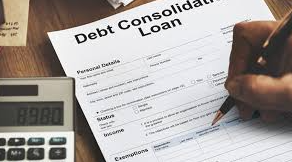Breaking Free from Credit Card Debt
Debt Consolidation vs. Debt Settlement
Credit card debt can feel overwhelming, especially when high interest rates make it difficult to pay down balances. If you’re struggling with bad credit, finding the right loan options can be a game-changer in regaining financial stability. National Client Shield (NCS) is here to help you navigate the world of debt relief, ensuring you make informed decisions that protect your financial future.
In this guide, we explore two key approaches:
- Debt Consolidation: Combining multiple debts into one lower-interest loan.
- Debt Settlement: Negotiating with creditors to pay less than what you owe.
Both options have their merits and drawbacks—understanding the details is essential before making any decision.
Debt Consolidation

Debt consolidation involves taking out a new loan to pay off one or more existing debts. This method can bring several benefits:
Pros of Debt Consolidation
- Lower Interest Rates: By consolidating debt, you may secure a lower interest rate than the weighted average of your current rates.
- Simplified Payments: Instead of managing several due dates and bills, you have a single monthly payment.
- Fixed Repayment Schedule: A clear timeline to debt freedom can improve budgeting and planning.
- Potential Credit Improvement: Consistently paying off a consolidation loan on time can boost your credit score over time.
- Avoidance of Multiple Collection Calls: With only one creditor to deal with, the hassle of juggling various collection agencies is minimized.
Cons of Debt Consolidation
- Eligibility Requirements: Lower interest rates are generally available to those with stronger credit profiles.
- Origination Fees: Some lenders charge fees to set up the new loan.
- No Reduction in Total Debt: The principal balance remains the same; it’s merely restructured.
- Risk of Default: Missing payments can further damage your credit score. *If you do not pay off your lenders with the loan, you wind up with more debt than you started with.
- Longer Repayment Period: Sometimes consolidation can extend your repayment timeline, increasing overall interest paid.
Debt Settlement

Debt settlement involves negotiating with creditors to accept a lower amount than what you owe.
Pros of Debt Settlement
- Reduced Debt Liability: You could end up paying significantly less than the full balance.
- Faster Resolution: Settlements may provide quicker relief compared to extended repayment plans.
- Avoidance of Bankruptcy: For those who are overwhelmed, settlement offers an alternative to filing for bankruptcy.
- Immediate Cessation of Collection Practices: Once settled, creditors typically stop aggressive collection efforts.
Cons of Debt Settlement
- Credit Score Impact: Settling a debt usually results in an account status noted as “settled” rather than “paid in full.” This can result in a temporary drop in your credit score by up to 100 points or more .
- Not All Creditors Agree: Some lenders may refuse to negotiate, leaving you with fewer settlement options.
- Potential Tax Liabilities: The forgiven portion of your debt can sometimes be considered taxable income.
- High Fees: Debt settlement companies may charge steep fees for their negotiation services.
- Long-Term Credit Damage: Settled debts remain on your credit report for up to seven years, affecting future borrowing power
Top Credit Card Companies
- Chase Sapphire Preferred – Known for reward benefits and travel perks.
- Capital One Venture Rewards – Offers flexible reward options for frequent travelers.
- Discover it Cash Back – Provides attractive rotating cashback categories.
- American Express Blue Cash Preferred – Best for everyday spending rewards.
Best Debt Consolidation Loans
- Achieve – Specializes in direct pay-off of credit card debts.
- SoFi – Offers competitive rates and flexible terms.
- LendingClub – Ideal for borrowers with fair credit profiles.
- Happy Money – Focuses on both debt consolidation and overall financial wellness.
- Best Egg – Provides secured loan options for those who have collateral to offer.
Top Credit Card Consolidation
- National Debt Relief – Specializes in negotiating lower amounts for credit card debt.
- Curadebt – Offers tailored debt settlement plans.
- Reach Financial – Known for streamlining the debt repayment process.
Final Thoughts: Charting Your Path to Financial Recovery
Credit card debt doesn’t have to dictate your financial future. By understanding both debt consolidation and debt settlement—with their respective advantages and pitfalls—you can make an informed decision that aligns with your long-term financial goals. National Client Shield is dedicated to equipping you with the insights and resources needed to protect your financial well-being.
Remember:
- Debt consolidation is best if you’re looking to simplify payments and potentially improve your credit score over time.
- Debt settlement might reduce your total debt more quickly but can temporarily lower your credit score by up to 100 points, among other risks.
If you’re ready to take control of your financial future, NCS is here to support you every step of the way. Together, we can build a plan that not only alleviates debt but also secures your credit for a brighter tomorrow.
References
: The Credit Pros – Profound Impact Of Debt Settlement: 7 Credit Insights.
: National Debt Relief Blog – How Debt Settlement Affects Your Credit Score.
For more detailed comparisons and personalized advice, consider reaching out to a trusted financial counselor or visiting our resources page here at National Client Shield.